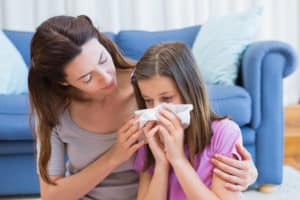Pediatric ear, nose, and throat disorders are one of the top reasons children visit a physician, according to the American Academy of Otolaryngology. In Birmingham, AL, common nasal conditions in children include frequent nosebleeds or a deviated septum that may require prompt diagnosis and treatment. As parents or caregivers, it is necessary to be educated about these common health concerns.
Pediatric ENT Associates specialize in the diagnostic and surgical care of head and neck diseases in infants and children. Our expert ENT specialists are all board-certified with current Alabama medical licenses, are actively published in peer review medical journals, and participate as teachers, presenters, and instructors both regionally and nationally. They are well-versed in the diagnosis and treatment of ear, nose, and throat conditions in children, ensuring that your child receives the best care possible.
Common Nose Conditions and Their Treatments
From nosebleeds to a deviated septum, there are many nose conditions that your child may endure at some point. Below, we’ve identified two common conditions and their respective risks, treatments, and prevention tips.

Nosebleeds
Epistaxis, which is the medical term for a nosebleed, is typically not a serious condition but may be a frightening experience for you and your child. It can be caused by trauma to the nose, accidentally damaging a blood vessel while picking the nose, or too much blowing of the nose. Nosebleeds can also be caused by overly dry weather which can dry out the inside of the nose, leading to damage. The use of certain medications with blood-thinning properties can cause nosebleeds as well. In some cases, it can be a symptom of other conditions, such as a deviated septum.
Risks/Complications
While epistaxis is rarely serious, you should take your child to a doctor under certain conditions:
- The nosebleed won’t stop after fifteen or twenty minutes of continuous pressure.
- The nosebleed is very rapid with a lot of blood loss.
- Your child has been experiencing multiple nosebleeds.
- The blood goes down your child’s throat despite having them tilt their head forward. If this happens, it could be a sign that the nosebleed is a posterior nosebleed, which is more serious than the normal anterior nosebleed.
- Your child has a face or head injury.
- Your child is ill, weak, feeling faint, or cannot breathe properly.
- Your child bruises easily and has blood in the gums, stool, or urine.
- There is a foreign object stuck in your child’s nose.
If nosebleeds occur over a prolonged period, this can also lead to other conditions such as anemia.
Treatment
Home care for nosebleeds includes applying pressure to stop the bleeding (pinching the soft part of the nose steadily). After five minutes, check to see if the bleeding has stopped, and if not, continue the application of pressure for another ten minutes. Applying a cold pack or compress on the bridge of the nose and using a damp washcloth to catch blood are also recommended.
Emergency nosebleed treatment under your physician’s care may include:
- Nasal packing – strips of gauze are placed inside the nasal cavity to put pressure on the bleeding site
- Cauterization – chemical substances such as silver nitrate or heat energy (electrocautery), may be used to help close the bleeding blood vessel
- Adjustments in medications to help control blood pressure may be prescribed. Patients may also be advised to reduce or stop taking blood thinning medications
- Correction of a nasal fracture or deviated septum
- Removal of foreign body inside the nose
Prevention
If your child has frequent nosebleeds, there are simple practices you can do at home to avoid them:
- Teach your child not to pick his or her nose or blow it too forcefully.
- Keep your child’s nails short to prevent irritation from nose-picking.
- If the air in your home is dry, install a cool-mist humidifier or vaporizer in your child’s room. Be sure to keep the machine clean to avoid mildew buildup.
- Use a saline wash, nasal spray, drops, or gel to keep the inside of your child’s nose moist. Petroleum jelly can also be gently dabbed around the opening of the nostrils.
- If participating in sports or other physically active hobbies, make sure your kids are wearing protective athletic gear.
Deviated Septum

A deviated septum occurs when the nasal wall separating the nostrils becomes abnormally configured, such as when the wall is displaced to one side. The resulting asymmetry may block the air flow through the nose. A deviated septum can be caused by an accident resulting in trauma to the nose or can be present from birth. While a deviated septum does not often cause insurmountable breathing problems for children, in cases where breathing is severely impaired, surgery may be considered to correct the septum.
Risks/Complications
If left untreated, a severely deviated septum can cause complications such as:
- Chronic sinus problems
- Disrupted sleep
- Loud breathing during sleep
- Only being able to sleep on one side
- Facial pain
- Dry mouth
- Pressure or congestion in the nasal passages
Treatment
Your child’s physician may recommend the following treatment options:
- Nasal decongestants
- Nasal sprays
- Antihistamines
- Nasal steroid sprays
- Septoplasty (surgical procedure)
It is important to note that the most effective way to correct a deviated septum is through septoplasty. It is a type of reconstructive plastic surgery that is performed entirely through the nostrils. During the procedure, the deviated portions of the septum may be readjusted and reinserted into the nose or may be removed entirely. While it is a more invasive treatment offered at our Birmingham, AL office, the treatment typically manages the symptoms and often eliminates them entirely and restores your child’s normal breathing. To learn more about septoplasty, visit ncbi.nlm.nih.gov
Prevention
You can help prevent your child from developing a deviated septum by avoiding injury to the nose. Help your child make it a habit to always wear seat belts and shoulder harnesses while riding in a vehicle and wear proper fitting headgear when participating in contact sports.
Schedule a Consultation with an ENT Specialist Today
Our experienced surgeons have expertise and years of experience in dealing with all manner of ears, nose, and throat conditions in children. You can trust that they can provide a comprehensive and thorough approach to your child’s care. If your child is having frequent nosebleeds, difficulty in breathing, or if you would like to learn about the other conditions we treat such as sinusitis, contact the surgeons at Pediatric ENT Associates, at Children’s of Alabama, in Birmingham, AL.


